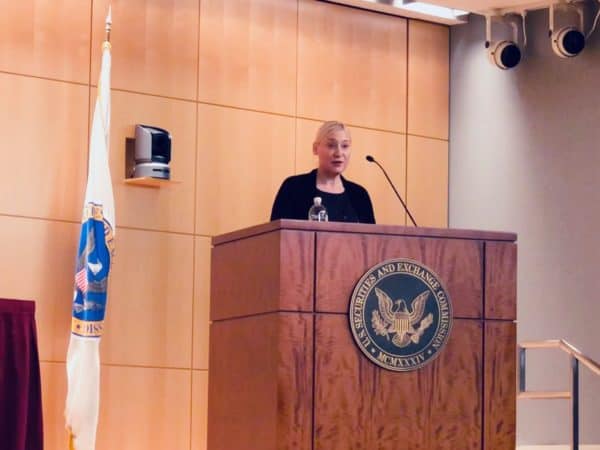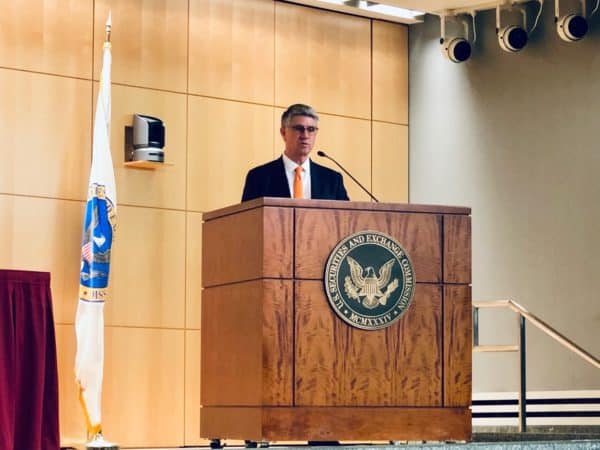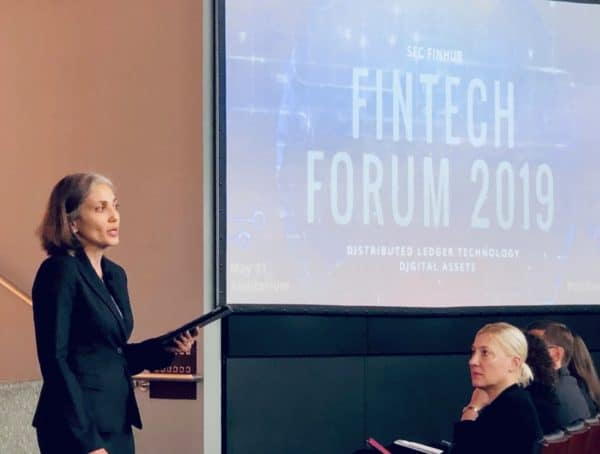Last Friday, the Securities and Exchange Commission (SEC) held its first Fintech Forum in years. The topic of discussion was the regulation of digital assets and distributed ledger technology (DLT). The interaction between presenters and SEC staff provided a glimpse into the progress and struggle behind regulating the new iteration of securities.
The Promise of the New Technology
“DLT works to create ecosystems the likes of which we have not been imagined before now,” stated Valerie Szczepanik, the head of the SEC’s FinHub as she opened proceedings.
While still nascent, said Szczepanik, DLT has created a way to transfer value but unlike speech on the internet, transfer of value can be highly regulated. It is important for the regulators to better understand the potential benefits as well as the risks she explained.
“We want to encourage beneficial innovation,” said Szczepanik. “While guarding against any harmful consequence. That balancing act is a difficult one. And we as regulators want to get that balance right. Why? Because it can mean the difference between fostering efficient and safe new ways to raise capital and trade assets on the one hand, or potentially permitting harmful systems, products, and practices on the other.”
One result can help markets. The other result can “cast a dark shadow” on the new technology, something that would dim the potential for innovation.
That is a result that no one who supports this technology would want, said Szczepanik.
SEC Chairman Jay Clayton was present for the opening of the event. Clayton said DLT is a new technology that has great promise for both efficiency and ability:
“But it doesn’t fit neatly into any spot within the Commission,” Clayton stated.
He expressed his opinion that blockchain possessed promise as well as challenges and lauded Szczepanik’s considerable efforts at the Commission.
Following a complimentary introduction by Chair Clayton, Crypto Mom – SEC Commissioner Hester Peirce, made a few comments.
Peirce said the opportune moment is now to work with the developers of the technology to make certain a well-intentioned framework is not an unnecessary barrier to the achievement of something good for society. The popular Commissioner attended a good portion of the Forum as an observer.
The scheduled panels were informative if lawyer heavy. Of note, Directors of the various SEC divisions took the opportunity to provide some insight into their regulatory perspective.
As previously reported, SEC Director of Corporate Finance, Bill Hinman, told the audience that a token may exist, and trade, while not being a security. While lacking in clarity, this comment should provide hope to utility token proponents. Hinman said we (the SEC) are eager to see the technology succeed.
Brett Redfearn, Director of Trading and Markets at the SEC, said that many regulations are still evolving. Redfearn assured the audience that just because trading takes place on a public blockchain securities law still applies. Otherwise, this would “disregard the Commission’s well-established framework for regulating exchanges.”
“Those online trading platforms located off-shore that offer securities services to persons in the United States, or solicit US investors to engage in primary or secondary trading of securities, also must register here [in the US],” sated Redfearn – without mentioning any specific crypto exchanges by name.
Thus an external crypto exchange must take “reasonable” steps to assure US persons do not utilize their services – unless they are registered as an exchange. These are early days for blockchain and Fintech in general, said Redfearn.
“Many digital asset trading platforms still suffer from poor execution quality, wash trading, and other manipulative devices,” warned Redfearn.
Dalia Blass, the SEC Director of the Division of Investment Management, addressed the topic of funds, such as ETFs, that may hold crypto and their approach to regulating these types of digital assets.
“Our request for conversation has fostered a number of constructive conversations and given the staff information to further our understanding,” Blass said.
Questions such as custody, valuation, liquidity, and the potential for manipulation were addressed in an open consultation commenced by Blass back in early 2018.
Blass said that some of the most constructive input has recognized that technological innovation is important but so is the investor focused foundation of the investment company act. She believes rules that have previously served the Commission well should not be sacrificed just to promote a nascent technology nor new investment type. More specifically, those targeting main street investors.
“Our doors are always open,” Blass told the audience, encouraging crypto-entrepeneurs to share their ideas with them.
The Director of the Office of Compliance, Inspections, and Examination, Pete Driscoll, told the audience they strongly embrace innovation and technology. Tech can drive down cost and improve investment returns. Driscoll said that the OC continues to closely monitor the issuance and trading of digital assets.
“OC is taking steps to identify market participants offering, selling, trading, and managing these products or considering, or actively seeking to manage these products and then assess the extent of their activities.”
In 2018, OC launched an investigation into investment advisory activity related to cryptocurrencies, initial coin offerings, secondary market trading, and blockchain technologies in general.
This continues to be a priority for OC in 2019, said Driscoll. He shared that regulated advisors are treading carefully before entering this space.
“When you get too prescriptive things tend to go out of date rather quickly.”
While the desire for perfection should not get in the way of innovation, the message was clear. The SEC is hesitant to over-regulate, or craft new rules, before they completely understand the evolving technology and what it means for regulated markets.
It is the hope of many industry participants that the SEC does not wait another three years for their next Fintech Forum.
If you have the time, and have not already viewed the SEC Fintech Forum, you may view it here.





